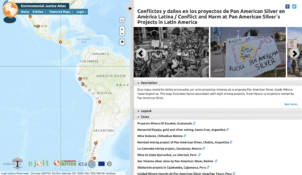
A new map illustrates conflicts and harms associated with eight mining projects, from Mexico to Argentina, owned by Pan American Silver.
https://ejatlas.org/featured/envconflictspas
In contrast to its discourse over sustainable and responsible mining, these conflicts demonstrate a lack of respect for communities defending their territories from mining. The company is profiting in areas where surrounding communities have faced militarization, criminalization, violence, harassment, and threats. Environmental pollution has been documented at several of its mines, which affect or threaten important water supplies. Labour conflicts have also arisen along with occupational accidents.
Disrespect for peoples opposed to mining
Pan American Silver (PAS) has bought large silver and gold projects despite the broad and widely recognized opposition of affected communities to mining activities.
In 2009, the company acquired the Navidad project in the province of Chubut, Argentina where open-pit metal mining and the use of cyanide is prohibited by law since 2003, following a local referendum and massive protests. Local environmental coalitions denounce that the company has tried to pressure local, provincial and national authorities to enable mining to go ahead. In 2014, over 17,000 Chubut citizens signed a proposed legislative initiative to reinforce the mining ban. The population is concerned about the potential impact of large-scale mining on the Sacanana watershed and underground aquifers.
In 2019, with its acquisition of Tahoe Resources, PAS took over the Escobal mine in southern Guatemala. Faced with broad-based peaceful resistance, the state and Tahoe Resources had resorted to criminalization, violence and militarization to repress the population and open the mine in 2014. The mine operated until mid-2017 when local residents blocked access to the mine and the court suspended operations over discrimination and lack of consultation with the Xinka Indigenous people. The court ordered the Ministry of Energy and Mines to consult with them. The Xinka have denounced the consultation process, which is still in process, as discriminatory and illegal, given the process is based on an area of influence that was determined before the process had officially begun.
The Shahuindo mine in Cajamarca, Peru is another project that PAS acquired with the purchase of Tahoe Resources. There is ongoing opposition to this project in the Condebamba Valley, a largely agricultural area, given concerns about its impact on local water supplies. Since 2016, Peruvian regulatory agencies have issued repeat reports of heavy metal contamination from the mine, finding that local water sources are not apt for human consumption. Residents have faced repression and criminalization for their protests over water loss and contamination from the mine. Tensions persist since PAS took over.
Profiting from militarization and subjugation of communities
In Mexico, communities where PAS operates live in a context of violence, militarization and subjugation. Between 2013 to 2017, PAS dispossessed the La Colorada community of their lands in the state of Zacatecas to expand its mine of the same name. The community was forcibly displaced by private security guards and their homes destroyed with heavy machinery. About 230 people were moved to a “Residential Unit”, where the company has tremendous control over daily life and residents live in suffocating conditions. Residents are concerned about potential impacts on their health, given the close proximity of their homes to the mine. The Committee of the Population of La Colorada continues its struggle to have their land rights recognized.
PAS bought the Dolores mine in the Tarahumara highlands, Chihuahua in 2012, in a context of extreme and increasing violence from the militarization of the area and a territorial dispute between organized crime groups. However, the increased presence of state security forces has not served to protect the population, but rather to impose the mine. For example, the military facilitated access to the mine site for the prior mine owner, Canadian company Minefinders, during a 17-month blockade that the Permanent Assembly of the Community of Huizopa sustained to demand better rent for their land and greater environmental monitoring. Later, local leaders denounced intimidation by federal police during a community meeting to decide on their agreement with the company, ensuring that the group favoured by the company won the vote. In mid-2018, when PAS was operating the mine, operations were suspended for a few days when violence along the road to the mine grew deadly and after company helicopters were threatened with attack. This situation severely limits the community´s freedom to exercise their rights in the case of any abuse or harm, as well as creating extraordinary risks for journalists and organizations who might seek to document the conflict or show solidarity with the community.
Environmental Impacts
Possible and actual environmental impacts of PAS´s mine projects are a source of concern among affected communities in diverse countries, especially given the danger that mining poses to water supplies and the wellbeing of these populations. As well, in a couple of cases, there is documentation of the corporate capture of environmental authorities, fostering impunity for environmental harm.
As already mentioned, concerns over environmental contamination, especially of water sources, has motivated resistance movements to the Navidad project and the Escobal and Shahuindo mines in Argentina, Guatemala and Peru respectively.
In the case of the Dolores mine in Mexico, prior to being bought by PAS in 2012, 100 Pima Indigenous families were displaced as the result of the diversion of the Tutuaca river and contamination from the mine. In 2010, there was also a cyanide sodium spill from one of the mine´s leach pads. However, community complaints to environmental authorities either went without response or were ruled to be unfounded (no environmental damage).
In the case of the Manantial Espejo mine, which operates in the province of Santa Cruz, Argentina, the approval of environmental impact statements is the responsibility of the Secretary of Mines, which represents a serious conflict of interest. In 2012, when there were spills from the pipe that connects the mine´s processing plant with the tailings dam, public officials minimized any possible environmental impact.
In Peru, the company has participated in efforts to weaken environmental enforcement, bringing a lawsuit against the payment of an annual payment necessary for the work of the Assessment and Environmental Control Agency (OEFA by its initials in Spanish). Meanwhile, the Quiruvilca mine – the first mine that PAS acquired and operated, from 1995 to 2012 in northern Peru – reportedly received 22 environmental fines during this time. The Peruvian press has recently called this mine a “time bomb”. PAS sold the mine to Southern Peaks Mining in 2012, at which point the mineral deposit was running low. PAS’s then CEO told the press that he trusted in the responsibility of Southern Peaks to take care of workers and communities. However, the mine was abandoned in 2017, and since then, there have been five emergency declarations in surrounding communities given the levels of heavy metal contamination in the Moche river related to acid mine drainage from the mine (which started before Southern Peaks took over), as well as the instability of its tailing impoundments
Labour conflict
There are also concerns related to PAS’ labour record. In Peru, from 2000 to 2019, the Ministry of Energy and Mines registered 42 fatal accidents from PAS subsidiaries (18 in Quiruvilca, 19 in Huarón and 5 in Morococha). In Argentina at the Manantial Espejo mine, two young operators were killed in 2015 and another in June 2019. In Bolivia, during the latest labour dispute over the San Vicente mine, the unión declared a “state of emergency” given the lack of security equipment and deteriorating working conditions in the underground operation. As of 2018, PAS had over 4,000 employees and contract workers who do not belong to any union or labour association, or about 57% of its total workforce.
This map counts on the general coordination and collaborative research by the EJAtlas group with MiningWatch Canada, Earthworks and the Global Economy Program at the Institute for Policy Studies, among others.





Great work! A relevant tool to understand the 25 years history of this Canadian mining company in Latin America, muchas gracias!